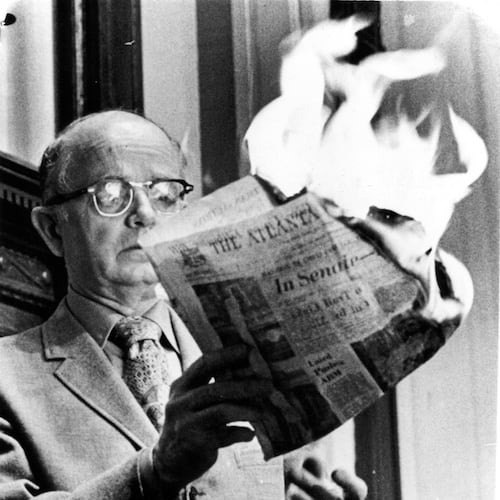SAVANNAH ― Shirley James hears often of the “historic” and “unprecedented” challenges faced by newspaper publishers in the digital age.
Her publication, The Savannah Tribune, faces the same threats as other long-running, print-centric media outlets. The advertisers’ exodus. The demise of classifieds. An aging readership. Younger generations that see social media channels as primary news sources.
For the Tribune, a weekly launched 150 years ago this summer as the Savannah Colored Tribune, the current business climate is not the worst of times. From its founding as a written information source catering to a largely illiterate audience ― most freed enslaved people had no formal schooling ― the Tribune has thrived on its ability to survive.
The publication has overcome censorship, distribution challenges, an ill-timed closure, a legal challenge that reached the Georgia Supreme Court, even a devastating fire.
Credit: Digital Library of Georgia Historic Newspapers Archive
Credit: Digital Library of Georgia Historic Newspapers Archive
The word “fortitude” belongs in the publication’s masthead, alongside the staff listing and contact information, jokes James and Tribune Vice President Tanya Milton.
“We have to be optimistic about this publication’s future because we are the voice of African Americans and they depend on us for the truth,” James said. “That was the charge that was handed to us. We have to tell our stories about what we do, what we have accomplished and historically what we have overcome.”
‘Fearless’ reporting builds trust, affection
James and her husband, Bob, are the third family to own the Savannah Tribune. Like their predecessors, they’ve stayed true to the publication’s founding principle ― to give Black residents a voice, particularly on racial and public policy issues, no matter the consequences.
Credit: Katelyn Myrick
Credit: Katelyn Myrick
The Tribune’s original publisher, John H. Deveaux, along with his partners, Louis B. Toomer Sr. and Louis M. Pleasant, printed their first edition in 1875 and met resistance from the earliest days. The Civil War had ended just a decade earlier, and the Black community was beset by low literacy rates. Reporting and editorials were written in plain language and in direct tones, so as to be easily understood.
The messages so antagonized Savannah’s white community that the city’s printing print operators refused to produce it starting in 1878. The Tribune went out of print for eight years before Deveaux found a new printer.
Three years later, Deveaux took a government job in Brunswick and sold the Tribune to Sol C. Johnson. The Johnson family’s ownership spanned seven decades and much of the Jim Crow era. He advocated for equality, with an emphasis on education. The Tribune’s stances on schoolhouse conditions and teacher resources and wages ingrained the publication in the fabric of Black Savannah, said Otis Johnson, the civil rights icon and two-term Savannah mayor.
“He was fearless in his critiques of the conditions we as African Americans were living under,” said Otis Johnson, who cites the Tribune as one of his earliest reading materials as a boy. “John Deveaux, Sol C. Johnson and now Shirley and Bob James, they’ve been doing what they should be doing as publishers of the paper in terms of our welfare and advancement. That’s why people in the Black community love the Tribune so much.”
Credit: Digital Library of Georgia Historic Newspapers Archive
Credit: Digital Library of Georgia Historic Newspapers Archive
Sol Johnson led the Tribune until his death in 1954 at age 85, but his descendants lacked his passion for the newspaper. It shuttered in 1960, just as the Civil Rights Movement was cresting in Savannah with a series of nonviolent protests, such as sit-ins at department store lunch counters, that led to desegregation.
Bob James, Shirley’s husband, recognized the community’s affection for the Tribune shortly after moving to Savannah in 1971 to run Carver State Bank. By then, the Tribune had become a nostalgic memory. The Carver State Bank’s board of directors, many of them lifelong Savannahians, spoke of the Tribune and how much the Black community missed it ― even as another Black weekly, the Savannah Herald, was in print at the time.
Shirley heard similar sentiments in her work as a counselor at Savannah State, the local historically Black university.
The Jameses sensed a business opportunity and resurrected the Tribune in 1973. They faced ― and won ― a challenge that make it to the Georgia Supreme Court over ownership of the publication’s name and history and have led the paper ever since, with Shirley taking on the title of publisher in 1983. The Tribune has never missed a publication deadline since its relaunch, even when an electrical fire on New Year’s Eve 2005 destroyed its offices and all its equipment.
Credit: Katelyn Myrick
Credit: Katelyn Myrick
Under the Jameses’ tenure, the Tribune has covered the rise of the Black political class in Savannah and Chatham County. Currently, Black leaders hold every jurisdictionwide elected office in the county, from Savannah mayor to district attorney and from Chatham Commission chairman to county coroner.
The Tribune’s stories on the issues and candidates ― and the publication’s endorsements ― have shaped that leadership.
When Otis Johnson called on the Black community to rally behind one candidate in the 2019 Savannah mayoral race in order to unseat an incumbent, he made the plea via a guest column in the Tribune, not in a televised speech, social media post or letter to the editor in the region’s daily newspaper of record, the Savannah Morning News.
“The Tribune is where our community turns for information still,” Johnson said. “That’s the Tribune’s place in Savannah.”
Evolving in the digital age
Savannah Tribune readers are largely print readers, and they aren’t shy about clinging so tightly that they get ink on their fingers.
The publication overhauled its circulation strategy early in the digital age. They made the print edition free and distributed it through more than 200 Black churches in the Savannah area. They estimate their readership at 45,000.
Milton, the advertising director, leveraged that reach in wooing advertisers and now says she does more “answering calls and emails” than “knocking on doors.”
The Tribune’s news coverage approach under James has always been rooted in news and happenings that uplift the community, with a focus on church and social life and highlighting achievements. They steer away from crime stories and those involving violence.
Credit: Digital Library of Georgia Historic Newspapers Archive
Credit: Digital Library of Georgia Historic Newspapers Archive
Yet the Tribune doesn’t shy from controversy when it comes to writing about issues that impact the Black community. James cites the bevy of voting law changes made since the 2020 presidential election, when false allegations of voter fraud led the Georgia General Assembly to alter the process around absentee ballots and in-person voting.
The Tribune’s news staff, led by Editorial Assistant Tirany Reeves, devoted hundreds of columns to explainers and notices about deadlines and application processes. The paper still publishes sample ballots.
“You talk about mission, and voting is at the core going all the way back to 1875,” James said. “Much of what we’ve been writing about in recent years is similar to what was in the Tribune all those years ago, and many times in between. We’re there for the community.”
The Savannah Tribune’s 150th anniversary celebration
The newspaper will mark the milestone with a Biscuit Brunch & Sneaker Ball, held in conjunction with the National Newspaper Publishers Association national convention. The NPAA is a trade association of the more than 200 Black-owned community newspapers from around the United States.
When: 10:30 a.m., June 28
Where: Plant Riverside District, J.W. Marriott, Savannah
Ticket price: $100 or $1,000 for a table of 10
Registration: eventbrite.com
ABOUT THIS SERIES
This year’s AJC Black History Month series, marking its 10th year, focuses on the role African Americans played in building Atlanta and the overwhelming influence that has had on American culture. These daily offerings appear throughout February in the paper and on AJC.com and AJC.com/news/atlanta-black-history.
Become a member of UATL for more stories like this in our free newsletter and other membership benefits.
Follow UATL on Facebook, on X, TikTok and Instagram.
About the Author
Keep Reading
The Latest
Featured









